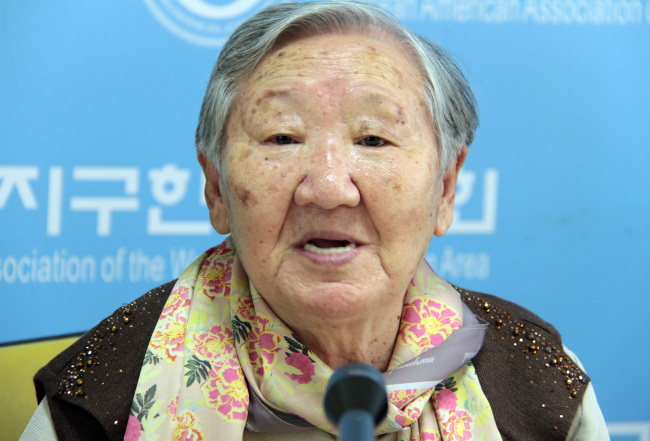Ex-sex slave hopes to install memorial statue at US university
By YonhapPublished : Oct. 18, 2017 - 09:45
Gil Won-ok was 13 years old when she was taken from her home in Pyongyang, now the capital of North Korea, to work as a sex slave for Japanese troops during World War II.
Now 90, the elderly South Korean woman flew to Los Angeles, and then to Washington, to share her story in song.
It lessens the pain of recounting her past, she said, and gives voice to her childhood dream -- to become a singer.
"No person is without fault, and what reveals it is not (another) person, but time," Gil told a news conference held near Washington, alluding to Japan's reluctance to accept responsibility for the crime.

"I may have realized my dream at 90, but I guess it's not the same as realizing it at a young age," she said.
Historians estimate that up to 200,000 women, mostly from Korea, were mobilized to work in frontline brothels for Japanese soldiers during the war. Korea was a Japanese colony from 1910-45.
The issue of the "comfort women," Japan's euphemism for the sex slaves, has long been a thorn in the two countries' ties.
In 2015, the two sides struck a deal to resolve the issue once and for all through a Japanese government apology and reparations to the South Korean victims. But many of the survivors and civic groups rejected the agreement over what they perceived as Tokyo's lack of sincerity and violations of the spirit of the deal.
In Washington, Gil was supposed to attend the unveiling of a girl statue symbolizing the victims at Salisbury University, Maryland.
But the plan was abruptly canceled due to what Korean activists said was likely opposition from the Japanese government.
"I think it's fair to say that installing such statues is hope for your future," Gil said.
She will still visit the university on Thursday at the request of the professors who had pushed for the project. The professors, the activists said, have promised to keep trying.
Asked if she would come back if the statue is placed, Gil said, "Wherever a girl statue is erected, I go to visit because I want to see it, but also because I have to meet her."
Tokyo has bristled at the erection of such figures, one of which is a rallying point outside the former Japanese embassy building in Seoul. Earlier this year Tokyo recalled its ambassador to Seoul to protest the installation of another statue outside its consulate in Busan, South Korea's second largest city.
"History is not something that can be erased because you want it to be erased," Gil said. "I hope the statue is installed quickly so that it goes down in history and the Japanese realize, 'Ah, this isn't how a human being should live.'" (Yonhap)








![[Graphic News] More Koreans say they plan long-distance trips this year](http://res.heraldm.com/phpwas/restmb_idxmake.php?idx=644&simg=/content/image/2024/04/17/20240417050828_0.gif&u=)
![[KH Explains] Hyundai's full hybrid edge to pay off amid slow transition to pure EVs](http://res.heraldm.com/phpwas/restmb_idxmake.php?idx=644&simg=/content/image/2024/04/18/20240418050645_0.jpg&u=20240419100350)








![[KH Explains] Hyundai's full hybrid edge to pay off amid slow transition to pure EVs](http://res.heraldm.com/phpwas/restmb_idxmake.php?idx=652&simg=/content/image/2024/04/18/20240418050645_0.jpg&u=20240419100350)

![[Today’s K-pop] Illit drops debut single remix](http://res.heraldm.com/phpwas/restmb_idxmake.php?idx=642&simg=/content/image/2024/04/19/20240419050612_0.jpg&u=)